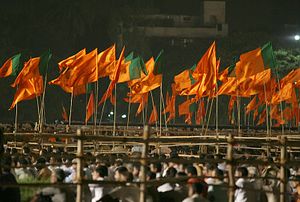Following the release of the Bharatiya Janata Party’s (BJP) 2014 election manifesto, there were widespread concerns that an ambiguously worded paragraph on India’s nuclear doctrine signaled that the party would seek to abandon the country’s long-stated no first-use (NFU) doctrine. The statement fit into conventional expectations that the BJP would likely pursue a more aggressive stance regionally compared to the more restrained posture used by the UPA. However, it seemed odd considering that no first-use was implemented by the National Democratic Alliance (NDA) coalition government led by BJP Prime Minister Atal Behari Vajpayee, under whom India formally became a nuclear power in 1998. Had the BJP’s thinking on nuclear matters changed to the extent of entirely revising NFU in just 16 years? Since the BJP is widely expected to win a plurality of seats in the Lok Sabha and form the next government in New Delhi, clarity on such issues is paramount.
In an effort to clarify the statements made in the manifesto, BJP President Rajnath Singh told the Hindustan Times that “the no first-use policy for nuclear weapons was a well thought-out stand of the [former BJP-led coalition government].” He added that the BJP does not intend to reverse it in any way. According to the Hindustan Times, BJP “party leaders say the policy has not only boosted India’s standing in the international community but also gives a certain amount of leverage in foreign-policy matters.”
So why did the BJP state in its manifesto that it would “revise and update” India’s nuclear doctrine? What about India’s present nuclear doctrine needs revising and updating, now that we know NFU is off the table? With that statement, the BJP could have intended to indicate that the party will likely speed up India’s acquisition of nuclear weapons and progress towards a nuclear triad. While both issues are not related to matters of doctrine, they will still have an important impact on India’s ability to stage a credible deterrent against both China and Pakistan. Currently, Pakistan has the world’s fastest growing nuclear arsenal and this has led to hawkish calls in India to keep pace with Pakistan.
The bigger concern for the BJP is likely China. India’s concerns about Pakistan’s nuclear weapons program are mitigated slightly by the fact that both countries are similarly poised materially and institutionally when it comes to their strategic nuclear weapons. Geographically, Pakistan’s lack of strategic depth makes it easier to deter with a limited nuclear arsenal. With China, there is more of a capability gap. India continues to work towards fielding a triad-based deterrent (meaning that it would field land-, air-, and sea-based delivery systems). Should the BJP come to power, it would likely allocate more resources toward this goal, empowering India’s Strategic Forces Command (SFC) and National Command Authority (NCA) in the process.
The controversy over revising NFU also particularly stemmed from an improper use of the term “doctrine” by the BJP. According to the Nuclear Threat Initiative, BJP member Ravi Shankar Prasad, who manages the party’s media strategy, said that the party consulted several experts. He added, “Some of them felt India had not optimally exploited its thorium reserves to boost its civilian nuclear program. But the nuances of all these aspects of nuclear doctrine cannot be discussed in a party’s manifesto. The [Indian government] Cabinet Committee on Security has to take a call after considering the facts before it.” The conflation of nuclear energy policy and doctrine led to the controversial news that India was about abandon NFU.
Overall, India has very good reasons to refrain from revisiting no first-use (and fewer reasons to revisit it). First, as the reaction last week demonstrated, the move would be perceived as provocative and lead to friends and foes alike questioning its intentions. For Pakistan, a revision of NFU would spook its strategic planners and lead to it doubling down on its nuclear capabilities. Furthermore, the move could have important effects on India’s delicate international status as a nuclear power. India is in the unique position of remaining outside of the scope of the Nuclear Non-Proliferation Treaty (NPT) as a non-signatory, but still being allowed to engage in civilian nuclear commerce thanks to a 2008 waiver from the Nuclear Suppliers Group (a development that was in part facilitated by the 2006 civil nuclear cooperation deal with the United States). India was able to demonstrate its low risk by pointing to features of its nuclear policy and doctrine like NFU. Therefore, any steps backward on that front would be damaging to India’s image as a nuclear power on the world stage.
For India’s hawks that might seek to revise NFU anyway, what seems to be an under-appreciated point is that NFU is a self-enforced pledge. Should India’s security situation deteriorate to the point that it would contemplate a nuclear strike (without having been struck by nuclear weapons already), it is probable that little consideration would be given to NFU as a matter of policy under such circumstances. I’d hazard a guess that despite how unlikely this situation appears, this would apply regardless of the party in power in New Delhi.

































